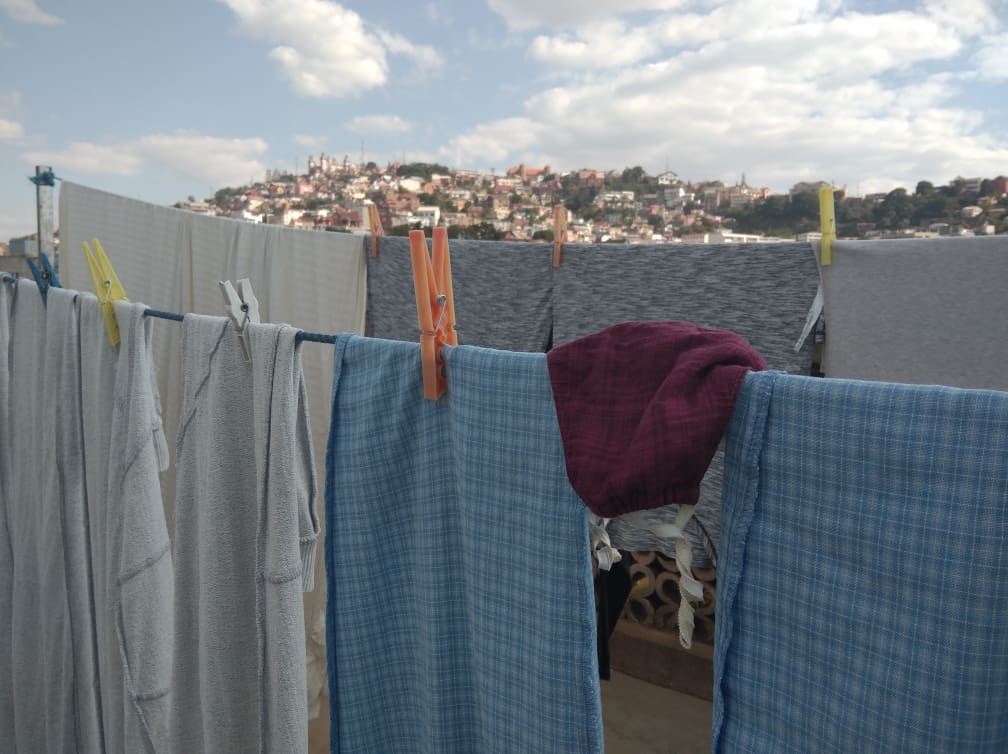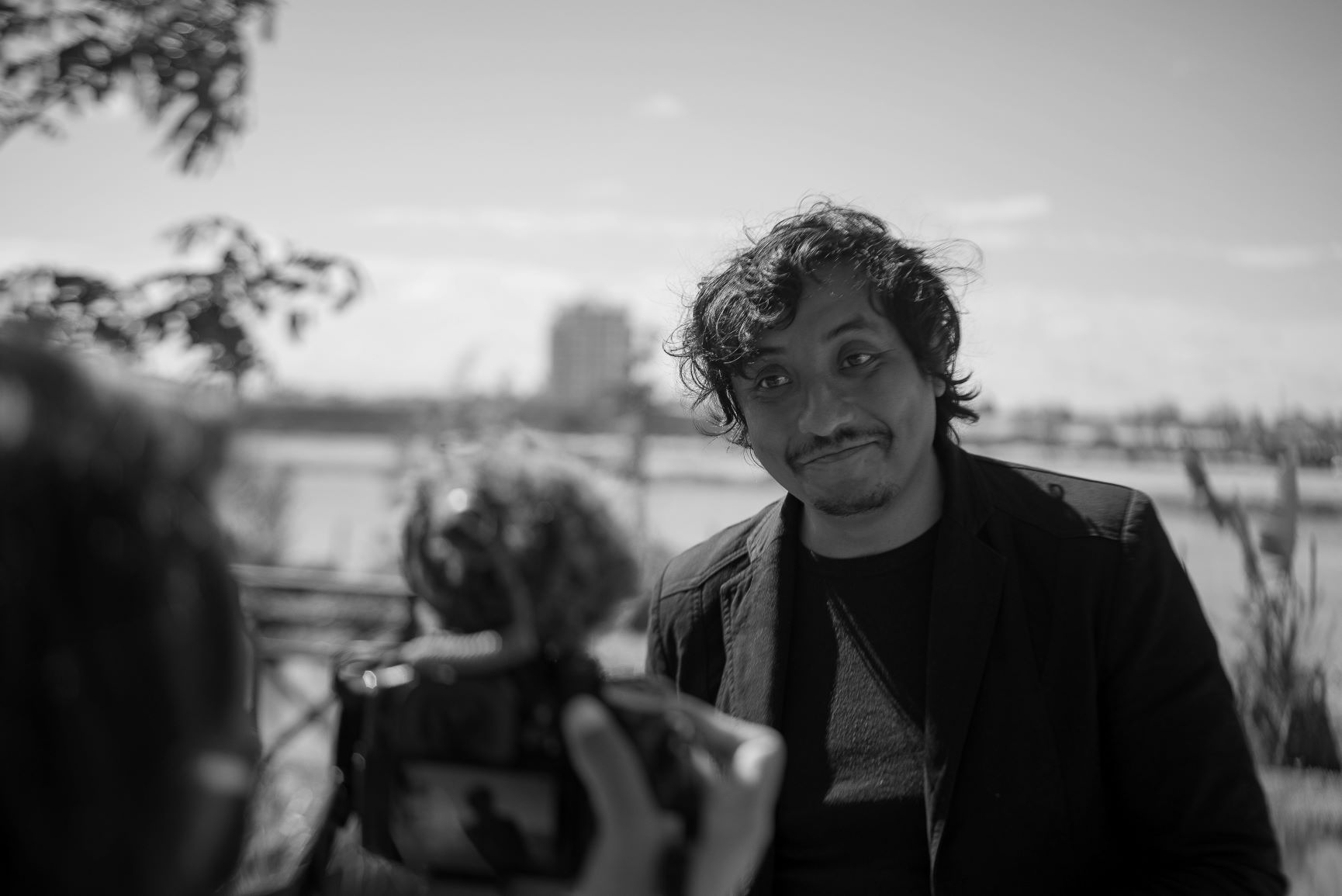Sous les masques d'Antananarivo
Une fois, je me suis surpris à admirer ces gens masqués qui marchaient par millions dans cette Antananarivo qui a été, à l’origine, pensée pour dix fois moins.
Je me suis dit que ces gens, ils sont quand même tous beaux. Quand on ne voit pas le bas de leur visage. Quand on prend le temps d’admirer leurs yeux, même furtivement.
Je me suis dit qu’avec nos masques, peut-être est-on finalement tous égaux, du moins face au diktat de la notion de beauté.
Moi qui ne puis tellement soutenir un regard pour une raison qui m’échappe, je me dis que peut-être disent-ils vrai ces gens qui assurent que les yeux sont le reflet de l’âme. Le masque qui nous protège a donc aussi fait que l’on puisse, pour une fois, et collectivement, avoir l’occasion de se focaliser sur l’âme.
Pour se protéger du Covid-19, dit-on, le masque ne suffit pas, il faut aussi se laver la main. On voudrait bien nous, mais ici, il y a tellement de coupures d’eau. Et ça c’est pour les foyers qui ont la chance d’avoir accès à l’eau courante.
Je me souviens de la fois où j’ai mangé un ramanonaka, une sorte de gâteau à base de riz, à un coin de rue. Les yeux de la dame qui me l’avait vendu me souriaient.
C’était si bon.
Puis, je me suis souvenu que le quartier était sans eau depuis des jours, j’ai jeté un regard furtif sur les mains de la dame, je me suis souvenu que son mari était mort il y a quelques jours, personne ne disait de quoi mais tout le monde savait, ça se susurre même que son mari était mort à l’hôpital faute d’oxygène qui, disait-on toujours, coûtait cinquante fois plus que ce qu’elle pourrait gagner en un mois. Et ça, c’était quand il y avait de l’oxygène, et quand le courant n’était pas coupé.
La dame me suivait du regard, je ne voulais pas la vexer, j’ai continué à mâcher mon ramanonaka, c’était si bon, je me suis convaincu que ça ira, vu que Covid-19 m’a cloué au lit il y a quelques mois de cela, je devais avoir une certaine immunité et ses yeux avaient de ces sourires.
Inmitten der Masken von Antananarivo
Einmal habe ich mich dabei erwischt wie ich diese maskierten Menschen bewunderte, die millionenfach durch Antananarivo laufen, das ursprünglich für ein Zehntel gedacht war.
Ich sagte mir, dass diese Menschen trotzdem alle schön sind, auch wenn man den unteren Teil ihres Gesichts nicht sieht; wenn man sich die Zeit nimmt, in ihre Augen zu sehen, wenn auch nur flüchtig.
Ich sagte mir, dass wir mit unseren Masken vielleicht endlich alle gleich sind, zumindest was das Diktat der Schönheitsideale angeht.
Mir fällt es nicht gerade leicht – aus mir unbekannten Gründen – Blicke anderer zu ertragen. Vielleicht haben die Leute ja recht, die sagen, die Augen seien das Tor zu Seele. Die Maske, die uns schützt, trägt also auch dazu bei, dass wir alle einmal und gemeinsam die Gelegenheit haben, uns auf die Seele zu konzentrieren.
Um sich gegen Covid-19 zu schützen, heißt es, reicht die Maske nicht aus. Man muss sich auch die Hände waschen. Das würden wir ja gerne, aber hier ist das Wasser häufig abgestellt. Und das betrifft die Haushalte, die das Glück haben, Zugang zu fließendem Wasser zu haben.
Ich erinnere mich an das eine Mal, als ich an einer Straßenecke einen Ramanonaka, eine Art Reiskuchen, gegessen habe. Die Augen der Verkäuferin lächelten mich an.
Er war so gut.
Dann fiel mir wieder ein, dass das Viertel seit Tagen ohne Wasser war. Ich blickte flüchtig auf die Hände der Frau, erinnerte mich, dass ihr Mann vor ein paar Tagen gestorben war – keiner sagte woran, aber alle wussten es; es geht sogar rum, dass ihr Mann im Krankenhaus gestorben ist, weil es kein Sauerstoff gab, der – so hieß es immer – fünfzig mal mehr kostete, als was sie in einem Monat verdienen könnte. Und das war, als es noch Sauerstoff gab und als das Wasser noch lief.
Die Frau folgte meinem Blick. Ich wollte sie nicht verärgern und kaute meinen Ramanonaka weiter. Er war so gut, dass ich mir einredete, es würde schon gehen, zumal Covid-19 mich vor einigen Monaten ans Bett gefesselt hatte; ich musste eine gewisse Immunität haben und ihre Augen lächelten so sehr.
Übersetzung: Jennifer Dummer
Under the Masks in Tana
One time, I caught myself admiring these people in masks, millions of them walking in this city of Antananarivo—which had been intended, at its inception, for ten times fewer.
I said to myself that these people, they are still all beautiful. When you don’t see the lower part of their face. When you take time to admire their eyes, even surreptitiously.
I said to myself that maybe, with our masks, we are finally all equal, at least faced with the tyranny of beauty standards.
I, who can’t really hold a gaze for a reason that escapes me, I say to myself that maybe those people who vow that the eyes are the reflection of the soul, maybe they speak the truth. And so, the mask that protects us has also made it so we can, for once, all of us, get a chance to concentrate on the soul.
A mask is not enough to protect yourself from COVID-19, they say, you also have to wash your hands. We’d very much like to do that, but here, the water gets cut so often. And that’s in houses that are lucky enough to have running water.
I remember the time I ate a ramanonaka, a kind of cake made with rice, on a street corner. The woman who sold it to me, her eyes smiled.
It was so good.
Then, I remembered that the area had been without water for days, I glanced surreptitiously at the woman’s hands, I remembered that her husband had died a few days before, no one had said what from but everyone knew, they even whispered that her husband had died at the hospital for lack of oxygen, which, they always said, cost fifty times more than what she could earn in a month. And that’s when there was oxygen, and there wasn’t a power cut.
The woman’s eyes followed me, I didn’t want to upset her, I kept chewing my ramanonaka, it was so good, I convinced myself things would be fine, seeing as how COVID-19 had laid me up in bed just a few months before, I had to have some kind of immunity, and her eyes held such smiles.
Translation: Allison Charette
Anaty maskan'Antananarivo
Indray maka aho, vaka nadinika ireny olona an-tapitrisany mandia anaty maska eto amin’ity Antananarivo izay voadinika ho an’olona an’hetsiny tany am-boalohany.
Hoy aho anakampo hoe, tsara tarehy ihany izato olona. Rehefa tsy hita ny tapany ambanin’ny tavany. Rehefa maka fotoana mibanjina ny maso, na dia tsipalotra fotsiny aza.
Hoy aho anakampo hoe, miaraka amin’ireto maska ireto, mety hitovy ihany ve isika ela ny ela, na dia eo anatrehan’ny jadon’ny maridrefin’ny hatsaran-tarehy fotsiny aza.
Izaho ity tsy dia mahavita jerena anaty maso loatra noho ny antony tsy takatro, nefa sady manontany tena hoe mety ho marina ihany ve ilay filaza hoe ao anaty maso no itarafana ny fanahy. Ilay maska miaro antsika izany dia sady nisarika ny saintsika, amin’ny ankapobeny, hahafahantsika hifantoka amin’ny fanahy.
Mba hiarovan-tena amin’ny Covid-19 hono, tsy ampy ny maska, mila manasa tanana koa. Mba te hanasa tanana ihany koa izahay, saingy aty, be loatra ny fahatapahan’ny rano. Ary izany aza ho an’ireo ambinina manana rano amin’ny robine.
Tsaroako indray mandeha izay nihinana ramanonaka aho teny an-dalana. Nitsika tamiko ny mason’ilay ramatoa mpivarotra.
Nafilotra ery.
Avy eo, tsaroako hoe efa andro maro izay no tapaka ny rano teo amin’ilay tanàna, nitsipalotra ny tanan’ilay ramatoa aho, tsaroako hoe maty andro vitsivitsy lasa izay ny vadiny, tsisy milaza hoe matin’ny inona izy nefa samy mahalala, mandeha aza ny siosio hoe maty tany amin’ny hopitaly izy noho ny tsifisiana okisizenina satria, araka ny siosio hatrany, avo dimampolo heny noho ny vola mety ho azony anatin’ny iray volana ny vidiny. Izany aza, rehefa hany misy ny okisizenina, rehefa tsy tapaka ny jiro.
Nanara-maso ahy ilay ramatoa, tsy te hanohina azy aho, nolerako hatrany ilay ramanonaka, nafilotra ery, nanamafy saina aho hoe tsy maninona izany io, efa tsy nahetsiky ny Covid-19 teo am-parafara ihany aho volana vitsivitsy lasa izay, tokony mba hanana fiarovana kosa aho sady tsara tsiky ery ny masony.
Translation: Mose Njo
Share












